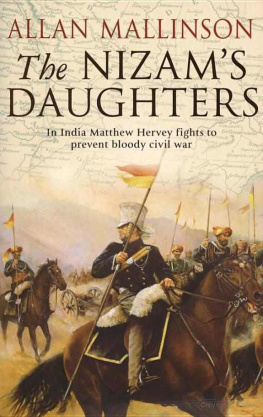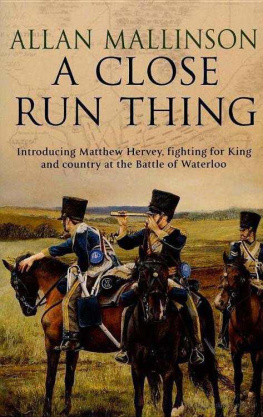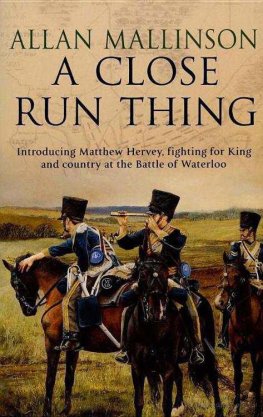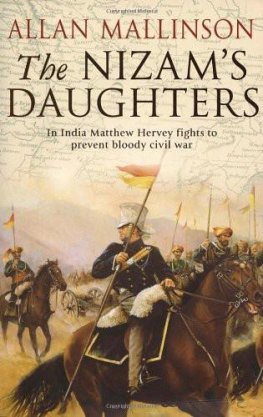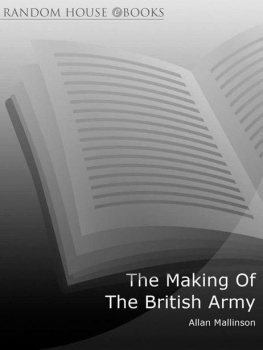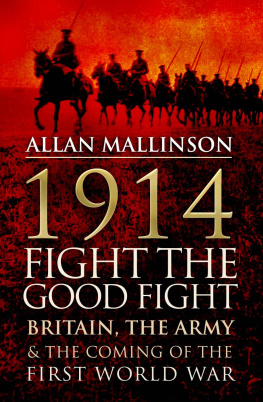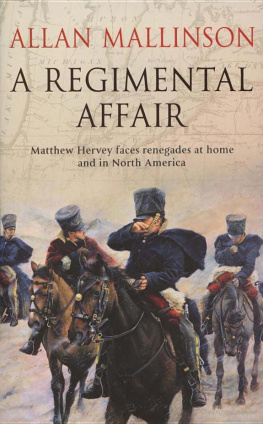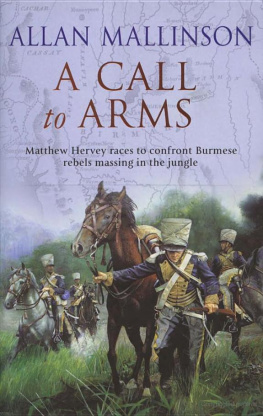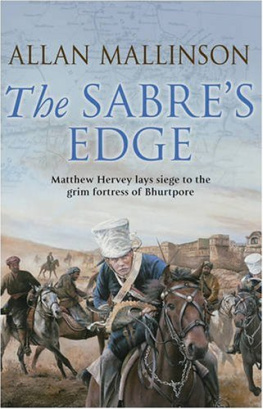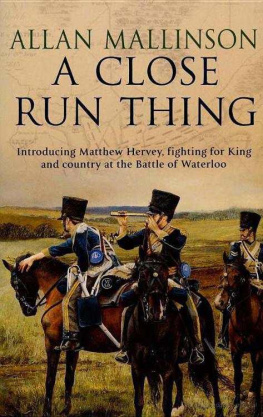Allan Mallinson - Too Important for the Generals: Losing and Winning the First World War
Here you can read online Allan Mallinson - Too Important for the Generals: Losing and Winning the First World War full text of the book (entire story) in english for free. Download pdf and epub, get meaning, cover and reviews about this ebook. year: 2016, publisher: Transworld, genre: History. Description of the work, (preface) as well as reviews are available. Best literature library LitArk.com created for fans of good reading and offers a wide selection of genres:
Romance novel
Science fiction
Adventure
Detective
Science
History
Home and family
Prose
Art
Politics
Computer
Non-fiction
Religion
Business
Children
Humor
Choose a favorite category and find really read worthwhile books. Enjoy immersion in the world of imagination, feel the emotions of the characters or learn something new for yourself, make an fascinating discovery.

- Book:Too Important for the Generals: Losing and Winning the First World War
- Author:
- Publisher:Transworld
- Genre:
- Year:2016
- Rating:4 / 5
- Favourites:Add to favourites
- Your mark:
- 80
- 1
- 2
- 3
- 4
- 5
Too Important for the Generals: Losing and Winning the First World War: summary, description and annotation
We offer to read an annotation, description, summary or preface (depends on what the author of the book "Too Important for the Generals: Losing and Winning the First World War" wrote himself). If you haven't found the necessary information about the book — write in the comments, we will try to find it.
Too Important for the Generals: Losing and Winning the First World War — read online for free the complete book (whole text) full work
Below is the text of the book, divided by pages. System saving the place of the last page read, allows you to conveniently read the book "Too Important for the Generals: Losing and Winning the First World War" online for free, without having to search again every time where you left off. Put a bookmark, and you can go to the page where you finished reading at any time.
Font size:
Interval:
Bookmark:
LIGHT DRAGOONS: THE MAKING OF A REGIMENT
THE MAKING OF THE BRITISH ARMY
1914: FIGHT THE GOOD FIGHT BRITAIN, THE ARMY AND THE COMING OF THE FIRST WORLD WAR
A CLOSE RUN THING
THE NIZAMS DAUGHTERS
A REGIMENTAL AFFAIR
A CALL TO ARMS
THE SABRES EDGE
RUMOURS OF WAR
AN ACT OF COURAGE
COMPANY OF SPEARS
MAN OF WAR
WARRIOR
ON HIS MAJESTYS SERVICE
WORDS OF COMMAND
TRANSWORLD PUBLISHERS
6163 Uxbridge Road, London W5 5SA
www.penguin.co.uk
Transworld is part of the Penguin Random House group of companies whose addresses can be found at global.penguinrandomhouse.com

First published in Great Britain in 2016 by Bantam Press
an imprint of Transworld Publishers
Copyright Allan Mallinson 2016
Cover photograph: Chronicle/ Alamy Stock Photo
Cover design: Stephen Mulcahey/TW
Allan Mallinson has asserted his right under the Copyright, Designs and Patents Act 1988 to be identified as the author of this work.
Every effort has been made to obtain the necessary permissions with reference to copyright material, both illustrative and quoted. We apologize for any omissions in this respect and will be pleased to make the appropriate acknowledgements in any future edition.
A CIP catalogue record for this book is available from the British Library.
Version 1.0 Epub ISBN 9781409011002
ISBN 9780593058183 (cased)
9780593058190 (tpb)
This ebook is copyright material and must not be copied, reproduced, transferred, distributed, leased, licensed or publicly performed or used in any way except as specifically permitted in writing by the publishers, as allowed under the terms and conditions under which it was purchased or as strictly permitted by applicable copyright law. Any unauthorized distribution or use of this text may be a direct infringement of the authors and publishers rights and those responsible may be liable in law accordingly.
1 3 5 7 9 10 8 6 4 2
La guerre! Cest une chose trop grave pour la confier des militaires.
(War is too serious a matter to entrust to military men,
usually rendered as
War is too important to be left to the generals.)
Georges Clemenceau,
Prime Minister of France November 1917 to January 1920,
quoted in Georges Suarez, Soixante annes dhistoire franaise (1932)
At no time, so far as I know, did it ever cross our minds that we could possibly not win the war, and we never knew how near we came to not winning it.
Guy Chapman MC,
Royal Fusiliers 191420,
in Vain Glory: A Miscellany of the Great War 19141918 (1937)
The Eastern Front
The Western Front
The Dardanelles
Battle fronts in mid-1916
For we have a peculiar power of thinking before we act, and of acting, too, whereas other men are courageous from ignorance but hesitate upon reflection.
Pericles, Funeral oration at the end of the first year of the Peloponnesian War, 430 BC
In July 2013, following the lead set by the government, the British army issued instructions laying out its approach to the First World War centenary commemorations Operation Reflect. Its aim was (and remains, until 11 November 2018) to mark the centenary of the First World War in an appropriate manner in order to commemorate the sacrifice of our forebears, learn enduring lessons, and educate ourselves and others.
This was something of a departure for the army. Hitherto it had steered clear of the First World War, perhaps because four years of stalemate seemed irrelevant to modern conflict. On the face of it, the campaigns of Marlborough and Wellington and the battles of the Second World War looked more likely to yield lessons in strategy and the operational art, while counter-insurgency campaigns such as those in Malaya, Kenya and Cyprus were the obvious places to seek inspiration in the war on terror.
The army launched Operation Reflect with a conference in London in July 2014, followed in September by a weeks staff ride in France and Belgium in which 150 hand-picked British and French captains and majors, led by the general officer commanding the 3rd (UK) Division and attended by the chief of the general staff, his French opposite number and several German officers, studied the course of the war on the Western Front on the ground over which it had been fought. It was all very high-powered, with just about every name in the book of British military historians taking part in one event or the other.
The captains and majors, fresh from Afghanistan, and in many cases with previous service in Iraq, were soon in awe of the sheer size of the problem that the British army had faced in the Great War, expanding as it had from a relatively small expeditionary force in August 1914 to some two million by 1918, 90 per cent of whom had never been in uniform before.
The London conference, the staff ride and the exploitation conference at Sandhurst which followed two months later were not designed to answer the questions about British generalship posed by entertainments such as Oh! What a Lovely War and Blackadder Goes Forth. Even so, it seemed to me that professional sympathy for the magnitude of the generals task, with much talk about the learning curve (in truth, a flat line for far too long), made for a sort of fatalism among the officers taking part which was not unlike that prevailing in the army of 191618 something along the lines of: Although things should never have got to this pass, the war is where it is and can only be won by destroying the German army on the Western Front, and in the process, come what may, huge numbers of men are going to be killed.
Indeed, this seems to be the growing consensus among historians. In one of the most recent and purportedly authoritative studies of modern warfare, Professor David Woodward of Marshall University, West Virginia, writes baldly of a cruel truth that costly frontal offensives were the only way to win the war.
I profoundly disagree.
As I have recently explained, personal and institutional failures both political and military marked Britains preparations for the war, and its early conduct. There were two literally vital elements missing: strategy and generalship. In fact, personal and institutional failures marked the next four years just as much, the want of strategy and generalship exacting a terrible tactical price not least in casualties that still taints the ultimate allied victory of November 1918.
Whether and when Clemenceau actually said that war is too important to be left to the generals is unimportant; it is what he thought, and the words have force. While aphorisms can be trite, at the time of their coining they have not of course been dulled by use. One of the problems in writing about the First World War, a conflict unsurpassed in the variety and volume of its literature, is language. Of some words and phrases there is now no common understanding: used often and indiscriminately, they no longer have meaning. Yet this is not to deny their original aptness. Clarify the language strategy, attrition, knocking away the props and so on as well as the context, and the truth is once again revealed. In March 1915, Henry James, sick beyond cure that he had lived to see the war, gave an interview to the New York Times. One finds it in the midst of all this as hard to apply ones words as to endure ones thoughts, James told the young journalist sent to interview him in London, Preston Lockwood, a Rhodes Scholar who would later serve with the French and then the US armies on the Western Front: The war has used up words; they have weakened, they have deteriorated like motor car tires... and we are now confronted with a depreciation of all our terms, or, otherwise speaking, with a loss of expression through increase of limpness.
Font size:
Interval:
Bookmark:
Similar books «Too Important for the Generals: Losing and Winning the First World War»
Look at similar books to Too Important for the Generals: Losing and Winning the First World War. We have selected literature similar in name and meaning in the hope of providing readers with more options to find new, interesting, not yet read works.
Discussion, reviews of the book Too Important for the Generals: Losing and Winning the First World War and just readers' own opinions. Leave your comments, write what you think about the work, its meaning or the main characters. Specify what exactly you liked and what you didn't like, and why you think so.

